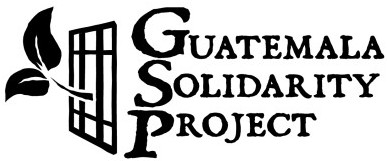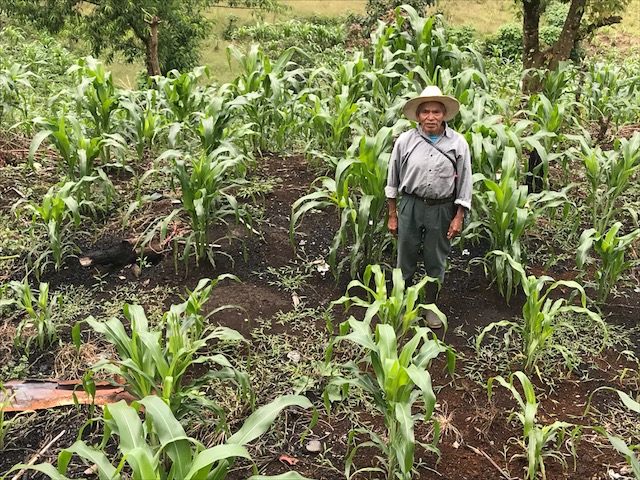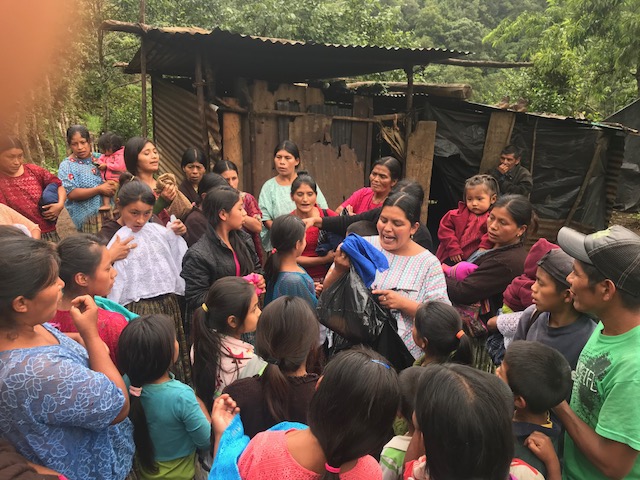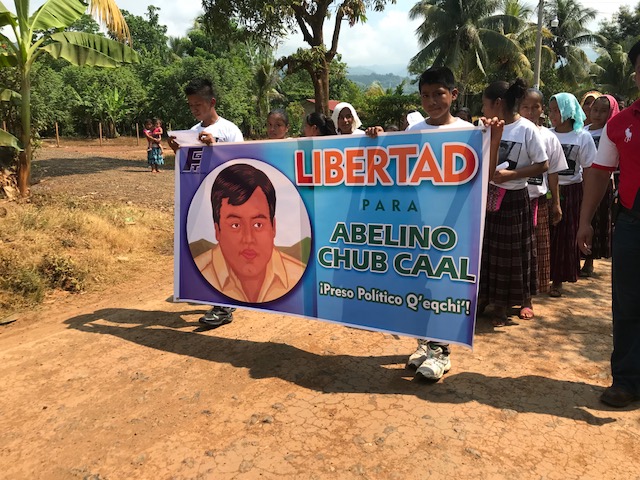Helicopters, Police, Paramilitary Attack Mayan Villages as US Calls for “Development of Guatemala’s Abundant Natural Resources”
Guatemala Solidarity Project Quarterly Report, August 23, 2018
GuatemalaSolidarityProject.org
This quarterly report includes a limited summary of some of the activities which the Guatemala Solidarity Project (GSP) has been involved in since May, as well as updates on some of the struggles our partners are enduring. We need your support and ask you to consider taking two specific actions in solidarity with our parters:
1) Make a donation to the GSP. We are a volunteer run organizations and all funds go to our partners on the ground, who determine funding priorities. Currently there is an urgent need for funds to support emergency medical assistance for people injured in attacks, political prisoners, clean water access for displaced communities, legal support for targeted communities, education access, and related efforts. Please donate via our website or by writing a check to UPAVIM and mailing it to UPAVIM, PO Box 63, Marshfield, VT 05658. Our fiscal sponsor the UPAVIM Community Development Foundation is a US 501c3, tax deductible, volunteer run organization that helps us ensure that all funds go to our partners in Guatemala.
2) If you are in the US, contact your US House Representative in support of indigenous leaders Roberto Caal and Isaias Ayu, who are facing judicial persecution as a result of their courageous nonviolent organizing in defense of indigenous rights and local ecosystems. They are facing an important hearing on Monday, August 27, so the sooner you contact your representative the better. More information about their case at the end of this report. Sample message: “My name is ______, I am a constituent, and I am calling with great concern about the government of Guatemala’s persecution of indigenous leaders, including Roberto Caal and Isaias Ayu of the municipality of Purulha in the department of Baja Verapaz. I would like my member of congress to contact the embassy and express concern about the August 27 hearing of Caal and Ayu. Human rights organizations say that Caal and Ayu are being charged for crimes they did not commit, and that they are being targeted because of their support for indigenous rights and the environment. Please let me know what the response of the embassy is.” (People outside of the US should contact the nearest Guatemalan embassy or consulate with a similar message)
La Cumbre Sa’Kuxha
The GSP has continued to work closely with the indigenous community La Cumbre Sa’Kuxha. On November 1, 2017 hundreds of police invaded the village and burned every home to the ground. Plantation owners, security firms and the government use this violent method to protect private interests at the expense of the indigenous people living in rural communities. This is not unique solely to La Cumbre.
“The government treats us like stray dogs, like we have no rights,” commented one of the women during our most recent visit to the community. Families in the community had worked for generations on the plantation without receiving pay. At the time of the attack, community leaders had been engaged in talks with the government to claim their legal right to land based on extensive labor violations. Now most of the community is located on a muddy hillside, where members fight hunger and continue to organize for their rights. Nearly a 45 minute walk from the nearest dirt road, they are forced to walk through the ruins of their homes to go to work, school or the market. At least six community members face fraudulent criminal charges as a result of their organizing.
La Cumbre Sa’Kuxha community members stands where his house was until the November 2017 police arson attack. The site is now used to grow corn for the plantation his family worked on for generations without receiving pay.
The community is severely lacking in basic necessities. There is not enough food and almost no space for crops. People are forced to live in cramped shacks. National and international pressure have forced the government to send food assistance to the community, but it is not nearly enough. They have no access to seek help regarding mental health.
These atrocities will not go unnoticed. The GSP will continue to denounce this criminal behavior by the government. Your donations are also needed to help us support the community with food and legal assistance.
Committee of Peasant Unity leaders distribute clothing during a recent GSP visit to La Cumbre Sa’Kuxha
Commemorating the Panzos Massacre
On May 29th 1978, Guatemalan soldiers opened fire on unarmed protestors gathered in the town center of Panzos, killing upwards of 140 people. This May 29th our partners invited us to accompany a protest commemorating the massacre and denouncing continued repression against indigenous communities in the region.
Panzos is in the Polochic valley, an area that for generations has been devastated by deforestation and large corporate agriculture. Enormous sugar cane and African palm plantations have decimated the region, turning soil infertile, contaminating drinking water and denying the Q’eqchi’ people of economic and food sovereignty.
The Polochic valley is one of the poorest and most underserved regions of Guatemala. Located along the highway, Panzos is the municipal center for thousands of indigenous people organizing in nonviolent resistance. Representatives from communities throughout the region made their way to Panzos on the 29th of May where the celebration and commemoration culminated in a march toward the city center. Banners and chants demanded the end of systematic oppression and the release of peasant leaders falsely imprisoned for their activism. The protest reminded the country and the world that peace has not yet come for them. Government and paramilitary forces have burned down the homes of thousands of indigenous Q’eqchi’ peasants in the valley in recent years.
Protestors carried signs demanding freedom for Abelino Chub Caal, one of a growing number of Q’eqchi’ leaders facing judicial repression. Chub was arrested on February 4, 2017, while celebrating his birthday with his wife and children. When asked why he was being arrested, the police replied “for being an indigenous leader.” Chub’s arrest warrant was issued shortly after he refused to accept a bribe from African palm company officials. He remains in prison on charges related to an October 26, 2016 incident in which nearly 2,000 police and private security participated in the “eviction” of a community not far from Panzos. The homes of hundreds of indigenous people were burned down. The government asked Chub to serve as a mediator before the eviction, but when he asked the government to give the community time to collect their possessions they instead attacked. Numerous peasants were injured and an elderly woman died in the days following the attack.
“Freedom for Abelino Chub Caal, Q’eqchi’ Political Prisoner!” reads a banner carried during the May 29, 2018 march commemorating 40 years since the massacre of Panzos.
The GSP worked with Chub for nearly a decade before his arrest, and we continue to visit him and other political prisoners on a regular basis.
The homes of thousands of indigenous peasants in the Polochic Valley were burned to the ground by the police in March, 2011. While such attacks have become common, it is rare to catch them on film.
Schools or “Investor Rights” in Purulha
Located within the region of Purulha in the department of Baja Verapaz lie the mountain communities of Xejbal Monte Blanco, Sib’i Ja and San Pablo Sab’ob’. The GSP is deepening its relationship with these communities by aiding in the construction of schools, teacher salaries and other financial obligations associated with the operation of schools. These communities have asked us to prioritize primary education because the government has denied their legal right to school access.
The government routinely denies educational access to indigenous communities because they are involved in land disputes. Land owners must give permission for a school to operate on their land, but there is almost never a clear legal land owner in indigenous territory because of the violent history and looting of these lands. The decision to not recognize indigenous title to land is a tool used by the government to oppress and justify violence towards individuals and theft and destruction of natural resources.
In January 2018, the GSP helped establish schools in Xejbal Monte Blanco and Sib’i Ja. This includes paying the first year of the teachers salaries, administrative and travel fees, and helping in the process of pressuring the government to take responsibility for school expenses. We do not wish to excuse the government from its responsibility to bring education access to these communities. However, after years of unsuccessfully lobbying the government for a school, the communities asked us to make the creation of new primary schools a priority. Our experience in other communities is that once a school is operational it becomes easier to pressure the government to take on this responsibility.
The GSP leads a percussion workshop during a recent visit to the Sib’i Ja elementary school
The main source of tension in the mountains of Purulha comes from the construction of a series of hydroelectric dams. Harvesting hydroelectric power includes not only damming rivers, but also diverting springs and other community water sources. This is yet another instance in Guatemala where, under the threat of violence, extractive industries are allowed carte blanche on indigenous lands without properly consulting communities who depend on the health of the land for their survival and success.
Hydroelectric dams in Purulha have not brought electricity to local indigenous communities. Instead they have brought extensive environmental destruction, including clearcutting of hillsides to access springs, large scale pollution of rivers, disruption of aquatic ecosystems and the loss of water access for thousands of indigenous peasants. The significant amount of energy and resources required to build this “green technology” makes it clear that it is not green at all. The dams aren’t even a logical financial investment. However, massive loans from the World Bank and other multinational institutions accompanied by thorough government corruption and the creation of a new multinational energy grid makes the expansion of giant hydroelectric dams in Guatemala a very lucrative business for a small number of corporations, politicians and wealthy families.
Indigenous and environmental activists have pressured the Guatemalan government to recognize the International Labor Organization Convention 169, which Guatemala (but not the United States) has ratified. ILO 169 requires that indigenous people have a say in hydroelectric dams, mines, oil exploration and similar “development” projects that occur in their territory. The GSP has accompanied numerous referendums on such projects in which indigenous people have overwhelmingly opposed this type of “development.” Because of this strong majority opposition the government and corporations have used fraud, violence and intimidation to prevent referendums from occurring. Currently Guatemala’s Constitutional Court is deciding a major, precedent-setting case involving a mine in indigenous Xinka territory. The mine was suspended for not having obtained the prior consent of the Xinka community, and the court will determine if the mine can reopen without receiving such consent. The ruling is likely to have a major impact on indigenous rights throughout the country, and many elements of the US government have pressured Guatemala to side against indigenous rights.
On May 21st, the US embassy released a public statement shamefully calling on the court to “issue without delay” its ruling to support the “development of Guatemala’s abundant natural resources.” The embassy knows very well that the process of issuing mining, hydro and other natural resource extraction licenses is based on corruption. The embassy also knows that most indigenous communities strongly oppose these projects, and that the government uses violence and judicial repression to support the extraction of natural resources. The embassy has significant influence in Guatemala, and its continued support for the looting of indigenous territory is unacceptable.
Within weeks of the embassy’s statement, hydroelectric company private security helicopters flew above the communities of Purulha. Shots were fired at villagers below, and although there were no serious injuries it was a clear act of terrorism aimed at intimidating the communities from attempting to organize a referendum about the hydroelectric dams. Dam representatives have repeatedly threatened community leaders, including via phone calls. During one such call, a community leader managed to record a conversation which included the statement “We are ready, I have pictures of the leaders, the security has pictures of the leaders, so that we can kill. I’m going to pay 10,000 quetzales [approximately $1,300] for each person they kill.” The recording was turned in to the police, and instead of taking action against the dam representatives they have filed charges against the man who took the recording.
On July 20, private security of a company working with the hydroelectric dams attacked the community Dos Fuentes, also in Purulha. Community leader Adolfo Ichich Chom was murdered, another villager was seriously wounded, and several acres of corn and beans were chopped down. Weeks later the public prosecutor’s office said they were unable to find witnesses and therefor couldn’t make an arrest – but many community members witnessed the crime and gave testimony. Instead, fraudulent charges have been filed against several Dos Fuentes community leaders.
Solidarity with Roberto Caal and Isaias Ayu
Hundreds of indigenous leaders in GSP partner communities face arrest warrants on fraudulent charges. In many cases we have collaborated with national and international campaigns to win freedom for political prisoners. Recent examples from Purulha include when community leader Moises Maas Tut was arrested on May 7, the GSP quickly organized and helped win his release on May 22. On June 10, Purulha community leader Jose Cacao was detained along with his eight year old son, and was released later in the month after the GSP helped coordinate efforts to win his freedom.
Such campaigns are most effective when coordinated rapidly and before targeted leaders are given prison sentences. That is why we are giving special focus in this report to the upcoming hearings of indigenous leaders Roberto Caal and Isaias Ayu, who are facing judicial persecution as a result of their courageous nonviolent organizing in defense of indigenous rights and local ecosystems. They have an important hearing on Monday, August 27, so the sooner you contact your representative the better.
Caal and Ayu were born just three months apart in 1979 and 1980 on a coffee plantation in the department of Purulha where their families had been forced to work without wages. Instead of attending school, Caal and Ayu were also forced to work as children. When members of the National Peasant and Indigenous Coordinating Committee (CONIC) came to the plantation to talk with workers about their rights, the two became fascinated. Still teenagers, they learned from CONIC and began to organize for their community’s land rights on the basis of generations of labor violations. In 2005, the families were given land and officially formed the community Los Angeles Maxaxa. In the following years, they began working with surrounding communities and plantation workers to help them organize for their rights.
Brief video made in August 2017 after the arrest of Roberto Caal and Isaias Ayu
Supporting indigenous rights made Caal and Ayu targets of threats and intimidation. On August 1, 2017, they decided to travel to the municipal center to file a complaint about these threats. After filing the complaint, they were told by police to accompany them to Salama, the department capital, to “work this out.” When they arrived in Salama they were immediately placed in handcuffs. They were later told they were being charge with a long list of invented crimes that included land theft, aggravated robbery and illegal detention. The GSP organized with our partners on the ground and helped win the release of Caal and Ayu one week later. The arrest was meant to intimidate and silence them, but in their words they “didn’t have to think twice” about continuing to speak out against government and corporate violations of human rights after their release. Because they have continued to stand for human rights they are now facing an even greater threat of extended imprisonment. It is crucial that concerned people take action in solidarity to help pressure the government and keep them out of jail. We have seen this type of pressure work in the past, but only if people take action. Please call your member of congress or closest Guatemalan embassy or consulate NOW!
Sample message: “My name is ______, I am a constituent, and I am calling with great concern about the government of Guatemala’s persecution of indigenous leaders, including Roberto Caal and Isaias Ayu of the municipality of Purulha in the department of Baja Verapaz. I would like my member of congress to contact the embassy and express concern about the August 27 hearing of Caal and Ayu. Human rights organizations say that Caal and Ayu are being charged for crimes they did not commit, and that they are being targeted because of their support for indigenous rights and the environment. Please let me know what the response of the embassy is.” (People outside of the US should contact the Guatemalan embassy or consulate with a similar message)



